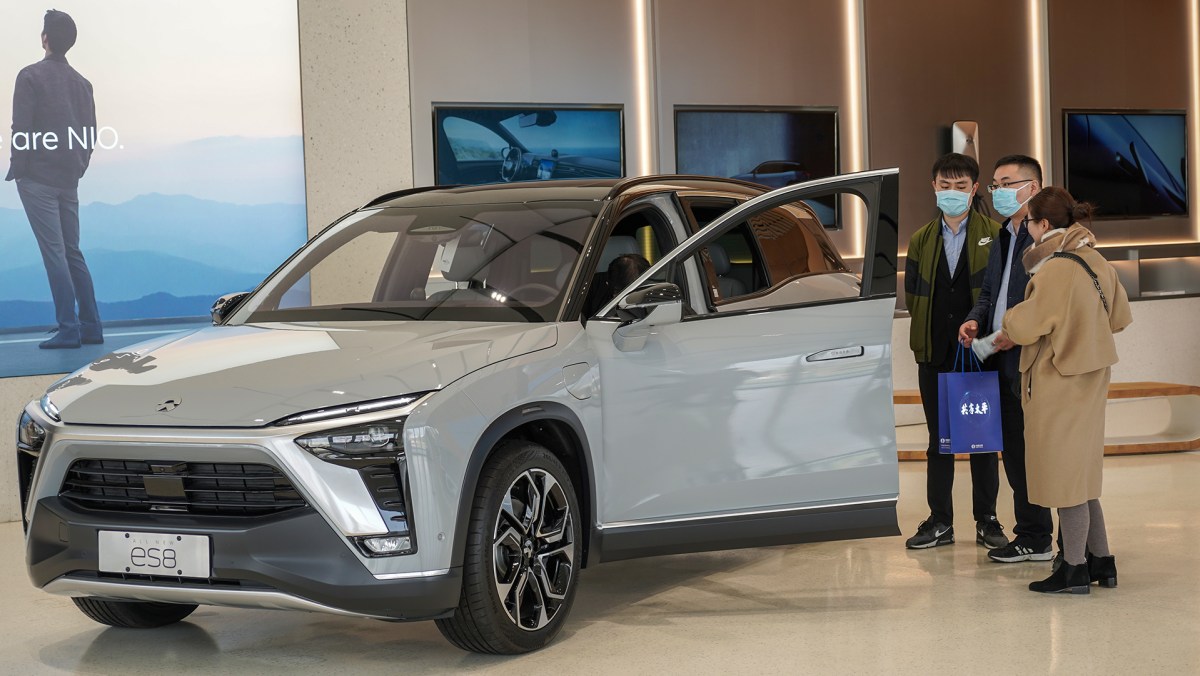Nio and Li Auto this week reaffirmed plans to stick to their pricing strategy, bucking an industry-wide trend of significant price cuts in China initiated by Tesla and followed by dozens of auto majors from Toyota to Volkswagen. The young electric vehicle makers are looking to protect their superior brand images and achieve profitable growth despite concerns of a slowdown in sales in the short run, according to industry observers.
Why it matters: The ongoing price war in the Chinese auto market has created an unhealthy situation, as it might cause a growing number of consumers to wait on the sidelines in anticipation of further price reductions, UBS analysts told investors in a Wednesday note.
- Sales in provinces with local subsidies such as Hubei could see a temporary boost, wrote analysts led by Paul Gong. However, they also cautioned that for many companies, their brand premiums could be negatively affected, making it more difficult to sell their cars at normal prices in the future.
- China’s passenger EV sales increased 9% year-on-year to around 131,000 units during March 1-12, while total retail sales of passenger cars declined 17% against the same period last year to around 414,000 units, according to figures published Wednesday by the China Passenger Car Association.
No price cuts planned: Nio has no plans to cut prices for, or release affordable versions of, its flagship models to counter recent price cuts by competitors, Pu Yang, assistant vice president of sales operations, told Chinese reporters on Tuesday. A Nio spokesperson confirmed the report.
- In-store visits to Nio showrooms over the past weekend rose to a new three-month high, according to Pu, who added that some potential customers are holding off on purchases and waiting for prices to stabilize, which has affected order intake.
- Nio will compete for a larger market share by offering competitive prices in the premium car segment and shoring up services with the expansion of its battery swap facilities, Pu said, citing the strength of its products and brands.
- Nio’s domestic sales declined to 2,170 units during the week of March 6-12 from 3,345 units a week earlier, according to figures compiled by Chinese auto trade media outlet EV Observer. In comparison, Li Auto’s sales grew by 32% to 4,243 units during the same week.
Protection against price cuts: Li Auto also made a related move on March 11 by offering a price guarantee on its EVs until the end of the month to reassure customers that no price cuts are on the horizon. CEO Li Xiang said on March 2 that the company would stand by its pricing strategy.
- Four car brands are following suit. On Monday, Denza, BYD’s premium EV brand, announced an upfront price protection program through which it will give customers a rebate if there is a price reduction for its D9 multi-purpose vehicles within 90 days of purchase. This comes soon after the company slightly raised the price of its electric minivan to RMB 395,800 ($57,302) on March 1.
- Lynk & Co, owned by China’s Geely Auto Group, as well as younger makers Hozon and Leapmotor, had made similar moves as of Thursday. However, on Feb. 27, Lynk & Co began selling a cheaper version of its 01 models, which will be available until the end of April at a price of RMB 159,900, an 11% reduction compared to the 2023 version of the hybrid crossover.
An all-out price war: China’s car price war was in full swing last week when state-owned manufacturer Dongfeng Motor slashed the prices of some models, such as the Citroen C6, by up to RMB 90,000, with the help of incentives from the government of the central Hubei province.
- At least 30 domestic and international carmakers have joined the fight, Bloomberg reported. SAIC-Volkswagen on Monday announced a massive cut of up to 20%, or RMB 40,000, for EVs under the German automaker’s ID family, SCMP reported. Meanwhile, some local BMW dealers reportedly offered a discount of as much as RMB 100,000 on its i3 sedans.
- Experts cited excess inventory of gas-powered vehicles, waning competitiveness of joint brands by Chinese makers and their overseas partners, and Beijing’s full implementation of new emission rules this July as reasons for the price reductions. Analysts from China’s Huatai Securities expected most price campaigns to last until the end of March.
- Multiple EV makers have been tempted to follow Tesla’s lead and reduce the prices of their vehicles since late last year when the US carmaker launched price promotions to boost sales. This was followed by a reduction of up to RMB 48,000 on select models early this year, forcing rivals from BYD to Xpeng Motors to lower their prices to stay competitive.
READ MORE: Chinese EV makers rush to offer big incentives as sales slide

